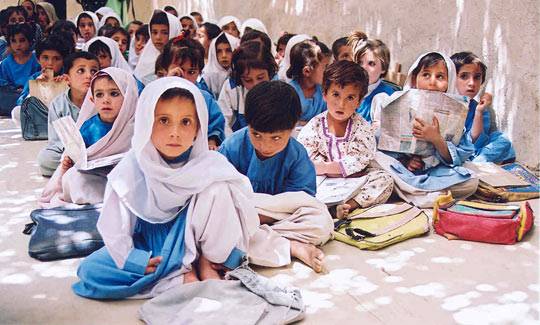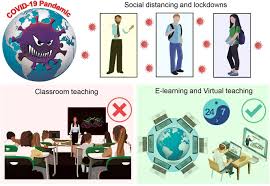
Uncertainty and distress lay ahead for students since the announcement by the Federal Minister of Education Shafqat Mehmood in November about the sudden closure of educational institutions. Apparently, this was the sole way of preventing children as country is failing in combating COVID-19 on other fronts.
Amid the second wave of COVID-19 around the world, the number of cases is rising with the change of weather conditions across Pakistan. According to the official statistics published by the Government of Pakistan, 3,308 confirmed cases are being reported in a single day in Pakistan. Sindh, being the second largest province by population, has marked the highest number of patients per day.
The pandemic which hit hard last year has shaken the world in numerous ways. One of the consequences is that of effecting education sector hard in the underdeveloped countries like Pakistan. This decision made by the government; on the one hand, is a step towards securing the health of the students and the staff, on the other hand, is bringing in many myriad challenges and shifts in the education system of Pakistan.
Many educational institutions are facing several issues. They are striving to maintain their reputation by not falling behind in providing the same quality of education online as before. The public institutions have suffered more than the private institutions due to the bureaucratic arrangement of allocation of resources, and the old rustic system. Many of these institutions tried but failed to maintain Standard of Protocols (SOPs) issued by the Government of Pakistan with the restoration of the conventional system after the first wave of COVID-19 due to the lack of provision of appropriate resources and funding in time. The sudden shift from traditional teaching to online teaching has put a lot of pressure both on the shoulders of the administrative as well as the teaching faculty. Many have lost their jobs while others are forced to work in multiple shifts. Most of them are coping with the stress of completing their tasks in time, delivering online lectures efficiently and engaging the students effectively with other distractions around.
Although disseminating education through online means is not a novel practice in the Pakistani education system. Many institutions are providing online education from the past many years but in the higher education sector only. Replicating these practices at other levels is exhausting and time-consuming. It requires a lot of familiarization, training and practice among the human resources involved, especially at the primary, secondary and post-secondary level of education to adapt to this new system. It also requires a lot more funding for the institutions to deal with the unexpected expenditure of purchasing equipment and related software for the smooth transmission of knowledge. The institutions also need to train their faculty to make them ready to deal with the situation. Though the problem requires a massive investment, it will have long term fruitful results.

At the moment, policymakers and the administrative authorities are also going through challenges. They have a limited understanding of dealing with this unwelcoming issue, and the reasons mentioned above which are associated with it. It now requires a triage strategic decision making and planning by the experts in different areas of education policy. An efficient inquiry of the problem will not only help to envisage and provide a more in-depth understanding but also assist the government. The planning experts need to come up with evidence-based administrative solutions and smart policies to better deal with this issue in the future.
Amid the second wave of COVID-19 around the world, the number of cases is rising with the change of weather conditions across Pakistan. According to the official statistics published by the Government of Pakistan, 3,308 confirmed cases are being reported in a single day in Pakistan. Sindh, being the second largest province by population, has marked the highest number of patients per day.
The pandemic which hit hard last year has shaken the world in numerous ways. One of the consequences is that of effecting education sector hard in the underdeveloped countries like Pakistan. This decision made by the government; on the one hand, is a step towards securing the health of the students and the staff, on the other hand, is bringing in many myriad challenges and shifts in the education system of Pakistan.
Many educational institutions are facing several issues. They are striving to maintain their reputation by not falling behind in providing the same quality of education online as before. The public institutions have suffered more than the private institutions due to the bureaucratic arrangement of allocation of resources, and the old rustic system. Many of these institutions tried but failed to maintain Standard of Protocols (SOPs) issued by the Government of Pakistan with the restoration of the conventional system after the first wave of COVID-19 due to the lack of provision of appropriate resources and funding in time. The sudden shift from traditional teaching to online teaching has put a lot of pressure both on the shoulders of the administrative as well as the teaching faculty. Many have lost their jobs while others are forced to work in multiple shifts. Most of them are coping with the stress of completing their tasks in time, delivering online lectures efficiently and engaging the students effectively with other distractions around.
Although disseminating education through online means is not a novel practice in the Pakistani education system. Many institutions are providing online education from the past many years but in the higher education sector only. Replicating these practices at other levels is exhausting and time-consuming. It requires a lot of familiarization, training and practice among the human resources involved, especially at the primary, secondary and post-secondary level of education to adapt to this new system. It also requires a lot more funding for the institutions to deal with the unexpected expenditure of purchasing equipment and related software for the smooth transmission of knowledge. The institutions also need to train their faculty to make them ready to deal with the situation. Though the problem requires a massive investment, it will have long term fruitful results.

At the moment, policymakers and the administrative authorities are also going through challenges. They have a limited understanding of dealing with this unwelcoming issue, and the reasons mentioned above which are associated with it. It now requires a triage strategic decision making and planning by the experts in different areas of education policy. An efficient inquiry of the problem will not only help to envisage and provide a more in-depth understanding but also assist the government. The planning experts need to come up with evidence-based administrative solutions and smart policies to better deal with this issue in the future.
